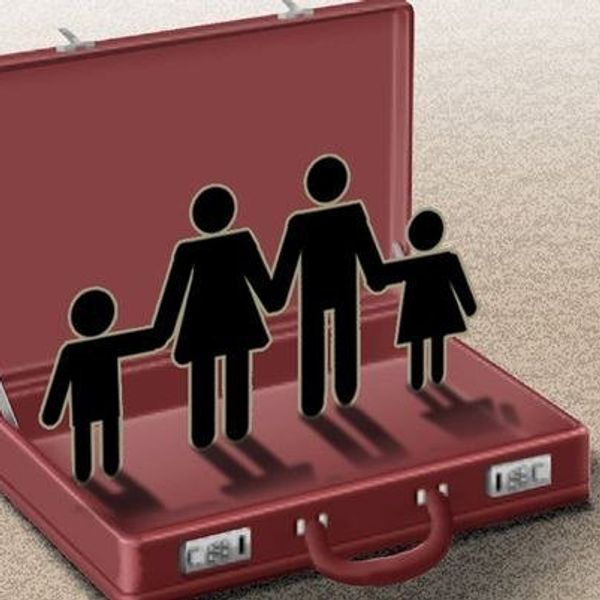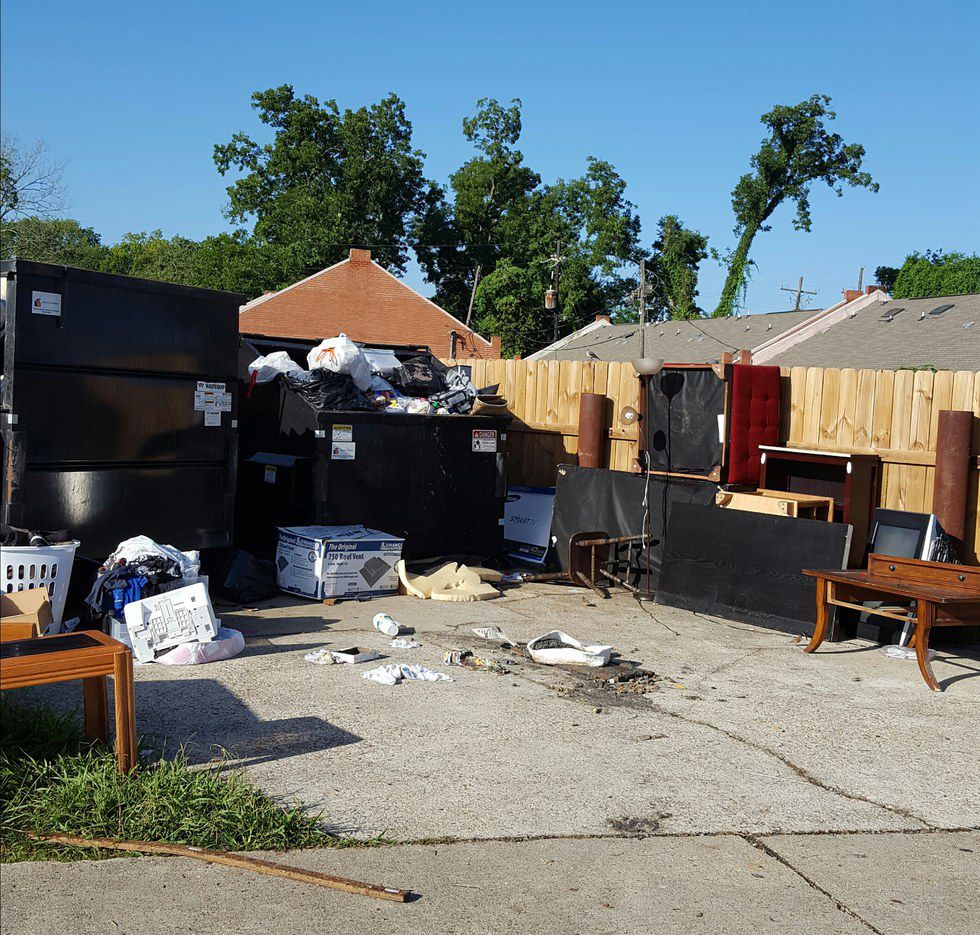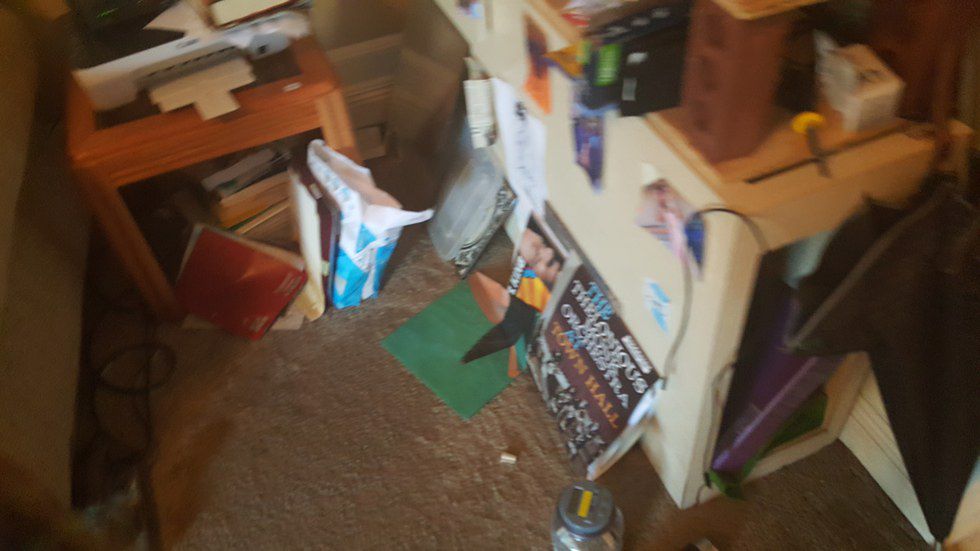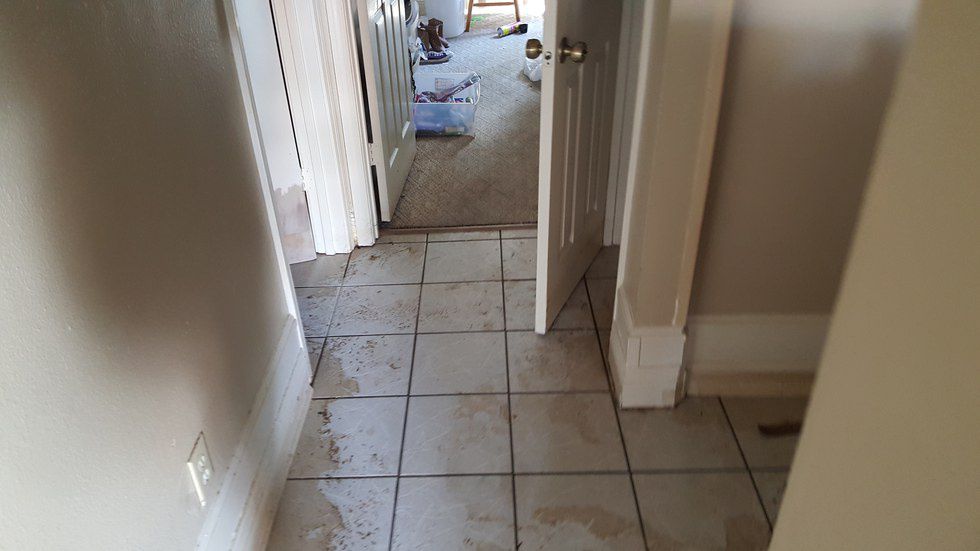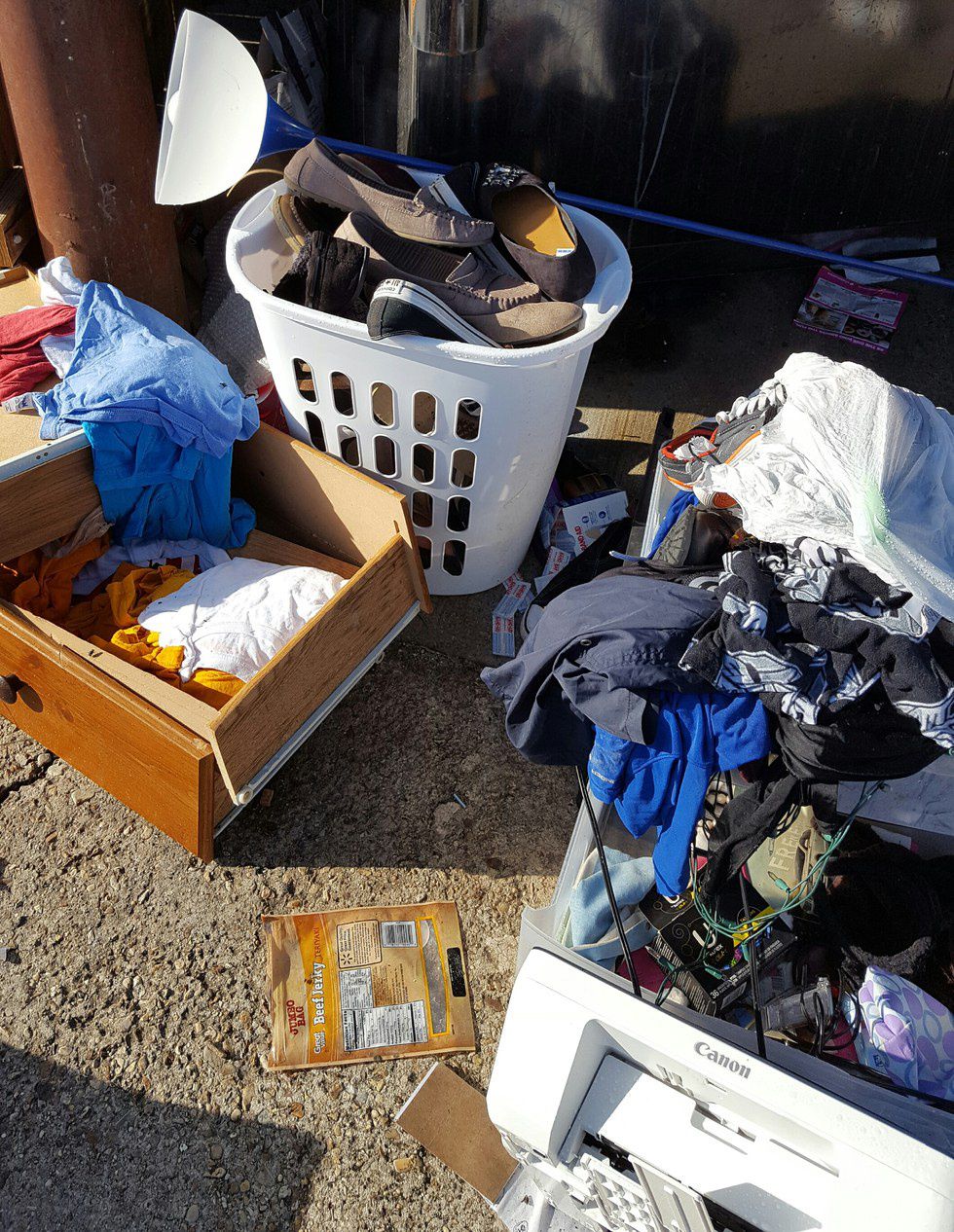I was hungry, sweaty, and dejected. I smelled bad. The air smelled bad too like pool water had a sewage-themed party and invited garbage along. Mosquitoes were the only happy guests.
After loading the hatch of my car with waterlogged books, moldy kitchen supplies, and ruined decorative pillows from my apartment, my mom hopped into the driver's seat to drive us to the nearly-full dumpster down the street. My friend Cori opened the door to the backseat and squeezed herself inside among other things I was forced to trash because of floodwater damage. For four days, I'd spent my nights on the couches and floors of various friends, and my days living in my car. My suitcase was open and exposed the disheveled semi-clean clothes I'd been choosing from as I waited until the water level lowered until it was safe enough to enter my apartment. My toiletries were strewn across the floor of the car. Trash was mixing with things I wanted to keep, other things I actually needed, and I was worried that Cori wouldn't have room to sit comfortably as we completed the dump haul. I was weirdly self-conscious about this, and I sat there in the passenger seat wondering if my mother and a devoted friend were judging my slovenliness. Rationality had no real place in the sorrow I had been feeling, and tears filled my eyes for the fifth or sixth time that day.
But Cori pushed everything to one side of the car and cheerily said "Let's do this," giving no consideration to the state of my backseat. My mom started the engine and backed out carefully through the remaining floodwater in the parking lot, and noticed my disposition. She touched my shoulder. "It's okay, Rachel. At least you'll have a good story to tell your grandchildren." All three of us giggled, and then the work continued.
Her comment got me thinking. My grandchildren's existence depends on whether I'll find a man I like enough to procreate, and my chances of succeeding at this task at age 24 honestly feel humorously bleak. It seems safe to assume, however, that I'll need to have the tale of the 2016 Louisiana Floods ready, just in case. Although the flood provides the climax, the real story begins long before the three days of non-stop rain that pummeled Baton Rouge and surrounding areas; long before I returned from a trip to my hometown to find my apartment submerged and stinking of sewage; before I spent days crying, drinking, and imposing on the space in my friends' homes. It begins when I thought I had gotten my life together, mostly through the acquisition of all of the things that soaked up gallons and gallons of dirty water inside my apartment in my absence.
I plan to tell my hypothetical heirs all about the tumultuous summer in Baton Rouge in which I said goodbye to my stuff. Dogma dictates that we place no value in the material things that we own and that we be ready to lose or replace them with no resistance. For days and weeks after the flood, when people asked me how I was doing or how I fared in the weather, they always comforted me by reinforcing this sentiment. I heard "Oh well, material things can be replaced!" in sugary voices and received texts that read "Well you're okay, and that's all that matters." I don't dispute these statements because they're both true. Some people lost their entire homes, and even their lives, and I'm definitely thankful to have survived with my body intact. But the sentimental value of the things I had been forced to throw away can't be replaced, and that thought is the driving force behind the tears and regret I still feel as I mentally compose a story to share with my future family members.
But will they think I'm materialistic because I'd tell them about my perfect full-size mattress? Will they criticize me because I cried when I had to throw away my paintings from the vinyl edition of My Beautiful Dark Twisted Fantasy? My black classic Converse shoes. Five notebooks full of notes and fiction stories. The incense holder that Cam and I used when we had our first apartment, the copy of "Milk & Honey" Cori had lent me, the comfortable couches I'd gotten as a gift from my mother's best friend, the television I bought with my last college refund check, the pillow depicting the naked African woman I'd gotten for Christmas, the NutriBullet my mother got for my housewarming party are all gone now. All worthless. All ruined. Those things meant something to me but in order to be considered "well-adjusted" or sufficiently "woke," I'm supposed to be able to let go of it all at a moment's notice and be fine. Well, that didn't happen.
I spent weeks in a deep funk. I relocated to my hometown with severely depleted resources and a damaged sense of self. I shunned family visits, ignored phone calls, and questioned which life choice I'd made that caused me to deserve the deluge that's stolen my autonomy.
I know better than to attach my self-worth to material things or expect grand purchases to heal any pain I may be feeling. I hear echoes of "First world problems!" when I think of what I lost. But how can I heal myself when the things on which I'd established my independent adult life are all inside an overflowing dumpster?
With time, of course. On a disconnected, conscious level, I know that I will replace everything I lost. I'll relocate with a shiny, new job offer, and then I'll restart my life. I'll start attaching meaning to new things and new people wherever I end up, and things will go back to normal. But I'll be different: a harder, smarter, more resourceful and more resilient version of the "me" I'd established before the flood, and that is the silver lining in this mess. That's the message I'll try to pass along to my grandchildren. I want to make sure they know it's okay to have things. It's also okay to have feelings towards those things. When tragedy inevitably strikes in one of its many forms, be it a flood, or a death, a hurricane or even a burglary, it's okay to mourn those things, and take time to acknowledge the loss and feel pain that others may consider unwarranted. But once you've felt it, it's vital that you latch onto the things that aren't so easily taken away, like your sense of humor, your love of literature and culture, and the generosity of your friends and family. Those are the things that saved me.
As I spent days laughing with my mother, cracking jokes with my cousins, binge watching Stranger Things and Greenleaf, and escaping through books in my hometown, I felt "me" return. I have emerged from the chaos of natural disaster refreshed and ready to take on the challenges required in re-establishing my independence and re-gaining my footing. Because as so many people in Louisiana continue to face hardships brought on by the flood, I'm able to see the horizons beyond it, and I'm able to pass along the vision to others. That's the value in this mess, and that's what I think is worth passing along to my grandchildren in the future. They can gain strength from the hardship I'm overcoming, and that fact alone makes this situation worth it.

